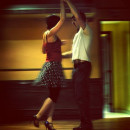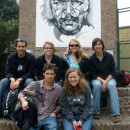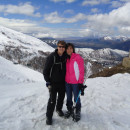Buenos Aires: A Big City with Big Opportunities. Past Review
By Nicole C (Speech Communications, Trinity University) for
IES Abroad: Buenos Aires - Society & Culture
I am much more calm now; I've learned to prioritize and see big picture, making coming back to small-school drama very difficult. While some would avoid an experience abroad with so many Americans, I learned a lot about myself by being around so many people with similar tastes for travel and exploration. I wouldn't change a thing.
Review Photos



Personal Information
| If you took classes at multiple universities, list those universities here: | Universidad de ciencias empresariales y sociales (UCES) and IUNA Departamento de artes del movimiento |
| How much international exposure did you have prior to this program? | 1 month - 6 months |
Review Your Program
|
* Overall educational experience
Academic rigor, intensity, resources, etc. |
The workload was easier than Trinity classwork by far. The classes were very educational but generally assigned little outside work. The grading system was adjusted to help ease the language barrier (all of my classes were in Spanish). The classes were normally longer in duration, meeting once or twice a week, very convenient for commuting to the center and having more free time to explore and participate in outside activities. |
|
* Host Country Program Administration
On-site administration of your program |
The program was overall very supportive and responded very quickly to our needs. I worked with them for a visa problem and they called me immediately to help take care of it. After a medical issue, the staff was very understanding with my new limitations and checked in on me frequently to see how I was doing. They also walked me through the insurance process which reimbursed me in full. When I had an issue with my partner university class, the Dean of Academics for IES handled it personally the same day I told him about it. The staff was always available for recommendations in the city, academic help or general questions about Argentina. The program was fairly large (140 Americans between 2 programs) but it was very well handled in an accommodating facility that included two study areas, wifi and computers for student use. My only complaint would be that program-sponsored trips were often unorganized though not to the point of compromising the trip. |
|
* Housing:
How satisfied were you with your living arrangements? |
I was fortunate to have a homestay that was only a 5 minute walk from the IES Center. Some students lived as far as 30 min away by bus or subway. The center was well located around public transportation though. My host family, a divorced woman and her niece, lived in a very safe area in a small apartment. I had my own room with a writing desk and, while small, there was plenty of room for my belonging to be well organized. My host family was very welcoming and friendly. For the first few months we ate dinner together every night but by the end we ate separately. I felt like a comfortable friend and house-mate more so than a family member but this worked out perfectly for me. I lacked nothing except maybe a few cooking supplies. |
| * Food: |
Host food was fine, she accommodated my habits of a "real" breakfast and less meat for more salads. There are plenty of good places around 9 de Julio and Paraguay or Santa Fe. If you need fast, try Trak (red building) or the wok place on Marcel T Alvear and 9 de Julio. If you need a good cafe, Martinz Cafes were my favorite. Havannahs are everywhere but expensive (like Starbucks). |
|
* Social & Cultural Integration:
How integrated did you feel with the local culture? |
They took us to a ranch and threw a wonderful welcoming party with local foods and dance, giving us the day to explore the area with bikes, horses and sports fields. The IES program offered trips (at additional fee or for free) almost each weekend to help us travel. |
|
* Health Care:
How well were health issues addressed during the program? |
|
| * Safety: |
IES prepared us well, informing us completely in orientation about how to obtain medical help and how insurance worked. I had two doctors visits where they pay a house call within 3 hours and prescribe as needed. My trip to the hospital for a head injury was well met by IES support as they checked in on me daily, spoke to my professors and helped me file insurance (which was completely reimbursed). |
| If you could do it all over again would you choose the same program? |
Yes
|
Finances
|
* Money: How easily were you able to live on a student's budget?
(1 = not very easy/$200+ on food & personal expenses/week, 2.5 = $100/week, 5 = very easily/minimal cost) |
|
| Not including program expenses, about how much money did you spend on food and other expenses each week? | I probably spent $100 (400 pesos) a week on food, assuming $10 a day for lunch and snacks on weekdays, more on weekends. |
| Do you have any general money-saving tips for future study abroad participants? | Don't plan to buy any electronics in Argentina, they are generally more expensive. |
Language
| * Did your program have a foreign language component? | Yes |
| How would you rate your language skills at the beginning of the program? | None |
| If applicable, to what degree did your living situation aid your language acquisition? |
|
| Language acquisition improvement? |
I could practice my Spanish with all of the IES staff and they were all very open to having casual conversations and helping us improve daily. My program was mostly Americans so English was the primary language in our IES center and when hanging out. The program is split into a Standard Program (with classes in English) and an Advanced Program (classes in Spanish). Standard Program kids were more likely to use English due to their more limited experience with it and Advanced kids experimented more in talking to each other and with locals. |
Other Program Information
|
* Where did you live?
Select all that apply |
|
|
* Who did you live with?
Select all that apply |
|
|
* Who did you take classes with?
Select all that apply |
|
A Look Back
| * What do you know now that you wish you knew before going on this program? | This is a big-city lifestyle similar to NYC. Students in this program should want to take advantage of the diverse culture here and the layers of city history mixed in with cool things to do constantly. |
Individual Course Reviews
| Course Name/Rating: |
Tango |
| Course Department: | IUNA |
| Instructor: | |
| Instruction Language: | Spanish |
| Comments: | This class was highly unorganized and made up of 50% Americans, 50% Argentines. The professor did not explain the steps well, expecting students to figure it out on their own. The class was overall very frustrating. I enjoyed it for the company of my friends and the private tutor that IES hired. |
| Credit Transfer Issues: |
| Course Name/Rating: |
Argentine Poetry |
| Course Department: | IES |
| Instructor: | Jorge Monteleon |
| Instruction Language: | Spanish |
| Comments: | This was a fantastic course. Prof. Monteleone is an internationally acclaimed critic, having recently published another anthology, and is well verse in not only Argentine poetry and literature but American and British works as well. He would expand beyond the cultural significance to teach general poetry elements and etymology of words. He spoke some English and French and used these well to benefit the class. He delivered interesting and educational lectures. |
| Credit Transfer Issues: | No |
| Course Name/Rating: |
Argentine Literature and the Formation of National Identity |
| Course Department: | IES |
| Instructor: | Laura Isola |
| Instruction Language: | Spanish |
| Comments: | Great course. Professor is involved and attentive to students' levels of comprehension and interest. Outside work involved exploring the city and investigated our own relationships between the city and our foreign roots. All assignments had room for creativity and exploration. |
| Credit Transfer Issues: |








